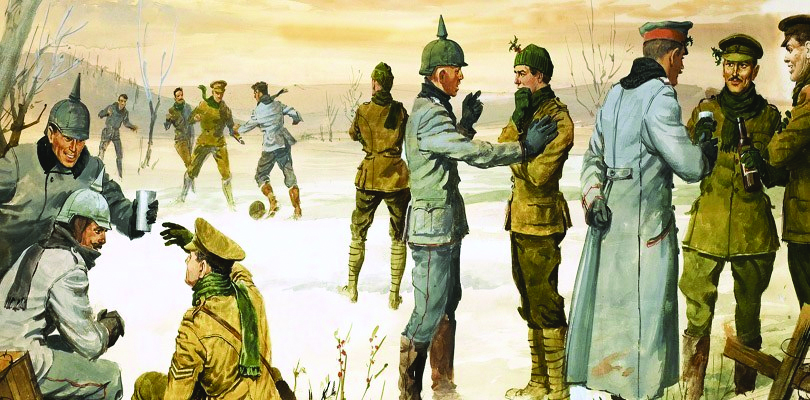The Christmas truce of 1914 was neither planned nor expected. Since late summer, the opposing British and German forces had been engaged in trench warfare, leaving the bloodstained ground between them a veritable no-man’s-land.
This was the last place anyone expected to find peace on earth, or good will towards men.
There was no directive for a cease-fire from Kaiser Wilhelm. Pope Benedict XV had called for an armistice, which was officially rejected. There would be no peace, and there was no Geneva Protocol to mitigate the horrors of warfare.
This war to end all wars was brutal. Almost 100,000 British soldiers would become casualties by the end of 1914, and by war’s end, 15 million would be dead. The night of Christmas Eve 1914 was drawing nigh, and for many soldiers in the trenches, it was to become the most memorable Christmas of their lives.
In the weeks leading up to that sacred day, the mail service delivered 2.5 million letters and 450 thousand parcels to the troops. There was a Christmas card for every British soldier from the King and Queen of England with the touching message, “May God protect you and bring you home safe.”
Christmas Eve arrived. Albert Moren, a 17-year-old British private serving with the Queen’s Regiment and stationed nearby, recalls, “It was a beautiful moonlit night, frost on the ground, white almost everywhere.” He continues, “Around 7:00 p.m. in the evening, we saw some lights and heard them singing ‘Stille Nacht, Heilige Nacht.’ It’s one of the highlights of my life; I will never forget it.”
Seventeen-year-old Leslie Walkington joined the Queen’s Westminster Rifles and was in the trenches on the eve of Christmas. Seventy years later his disbelief was still evident. “How did it ever happen? I don’t know if anybody can explain it; it just happened.”
Graham Williams, a 21-year-old soldier with the London Rifle Brigade, was on watch ten miles to the north in a front-line trench. The glow of lights all along the German parapets flickered into view while a familiar melody rose softly over the battlefield accompanied by the voices of German soldiers, singing in harmony, “Stille Nacht, Heilige Nacht.”
The British soldiers who did not speak German recognized the melody and joined in the chorus singing, “Silent Night, Holy Night.” As the song concluded, the British soldiers applauded and returned fire with a rendition of “The First Noel.” As the British soldiers concluded with the words “Born is the King of Israel,” the German soldiers applauded and returned volley with a favorite carol of their countrymen, “O Tannenbaum, O Tannenbaum, Wie treu sind deine Blatter.”
The British soldiers again applauded the familiar harmony that in years to follow would become “O Christmas Tree, O Christmas Tree, how faithfully you blossom.” The British soldiers did not want to be outgunned, so they locked and loaded with a rendition of “O Come All Ye Faithful.” The Germans immediately joined in singing the same hymn to the Latin words “Adeste fideles, laeti triumphantes.”

Both sides were in harmony with a chorus of worship to God.
Leslie Walkington recalls, “They sang something, and we applauded. Then we sang something, and they applauded. I think they were a bit better at it than we were. The Germans are very fond of male voice choirs, aren’t they? They sang them rather beautifully.”
Upon the dawn of Christmas morning, a lone German soldier boldly climbed out of the trenches and stepped onto the field of battle. With his arms raised above his head, he shouted out “Merry Christmas.” Prompted by this brave action, soldiers from both sides began to cautiously walk out and join him. Before long, both armies had gathered in the field of battle. They were talking, laughing, shaking hands, and swapping chocolate,
cigarettes, cognac, buttons, pins, and other gifts they received from their families back home.
Scenes of joy were being played out along much of the 30-mile British front. Spontaneous scrimmages of soccer were being played, and the solemn work of burying the dead was peacefully at hand. Though no military documents exist authorizing this divine armistice, the hundreds of pictures taken and letters written home to assuage their loved ones confirm the miracle of the Christmas truce.
German Lieutenant Kurt Zehmisch recalled: “How marvelously wonderful, yet how strange it was. The English officers felt the same way about it. Thus Christmas, the celebration of love, managed to bring enemies together as friends for a time.” Peace on earth and good will towards men, on whom His favor rests.
